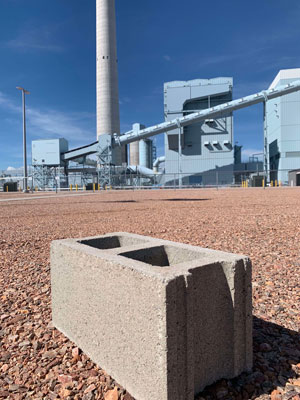CO2Concrete, an entity incubated at the University of California, Los Angeles, has changed its name to CarbonBuilt to better align with a mission to store significant amounts of carbon dioxide in concrete used for the built environment. Developed over the course of seven years at the UCLA Samueli School of Engineering-hosted Institute for Carbon Management, the CarbonBuilt Reversa platform spans concrete mix design and curing innovations.

The Reversa formulation includes calcium hydroxide, a commodity used in a wide range of applications and enabling the increased and more flexible use of waste materials like fly ash. In the Reversa curing process, carbon dioxide contained within dilute flue gas streams—utilized as they are, no capture or purification required—is permanently sequestered into the concrete. Together, the innovations enable producers to sharply reduce the carbon footprint of manufactured concrete units or elements in a manner that increases profitability.
The first field demonstration of CarbonBuilt technology at scale took place in 2019 at the Wyoming Infrastructure Authority’s Integrated Test Center, where the team sequestered CO2 from a coal-fired power plant in more than 10,000 concrete masonry units. A second demonstration, using waste CO2 from a natural gas-fired turbine at the National Carbon Capture Center in Alabama, is under way. The demonstrations highlight the Reversa platform’s ability to accommodate a variety of dilute CO2 streams, unlocking the potential for partnerships across a wide range of industries.
“The incredible size of the concrete market and its ability to permanently store carbon make it perhaps the best opportunity the world has to reduce carbon dioxide emissions,” says Rahul Shendure, newly appointed CarbonBuilt chief executive officer. “Our ‘no compromise’ concrete meets the sustainability needs of builders and customers while offering a compelling value proposition for producers and companies seeking to reduce their carbon footprint. Together, this adds up to the potential for a gigaton-scale reduction in emissions.”
An MIT Chemical Engineering and Harvard Business graduate, Shendure arrives with 20-plus years in climate- and bio-tech businesses. After starting as a GE Plastics chemical engineer, he held senior product management and business development roles at Amyris and Ballard Power Systems, and co-founded Oscilla Power and Bellwether Bio.
Advisors to Shendure and CarbonBuilt are Kendall Anderegg, chief executive officer of Bellevue, Wash.-based Mutual Materials Co. and 2018-2019 Interlocking Concrete Pavement Institute chair; Walter Dissinger, former chief executive officer of Votorantim Cimentos; and, Anne Ellis, Charles Pankow Foundation executive director, AECOM management veteran and 2013-14 American Concrete Institute president. — www.carbonbuilt.com